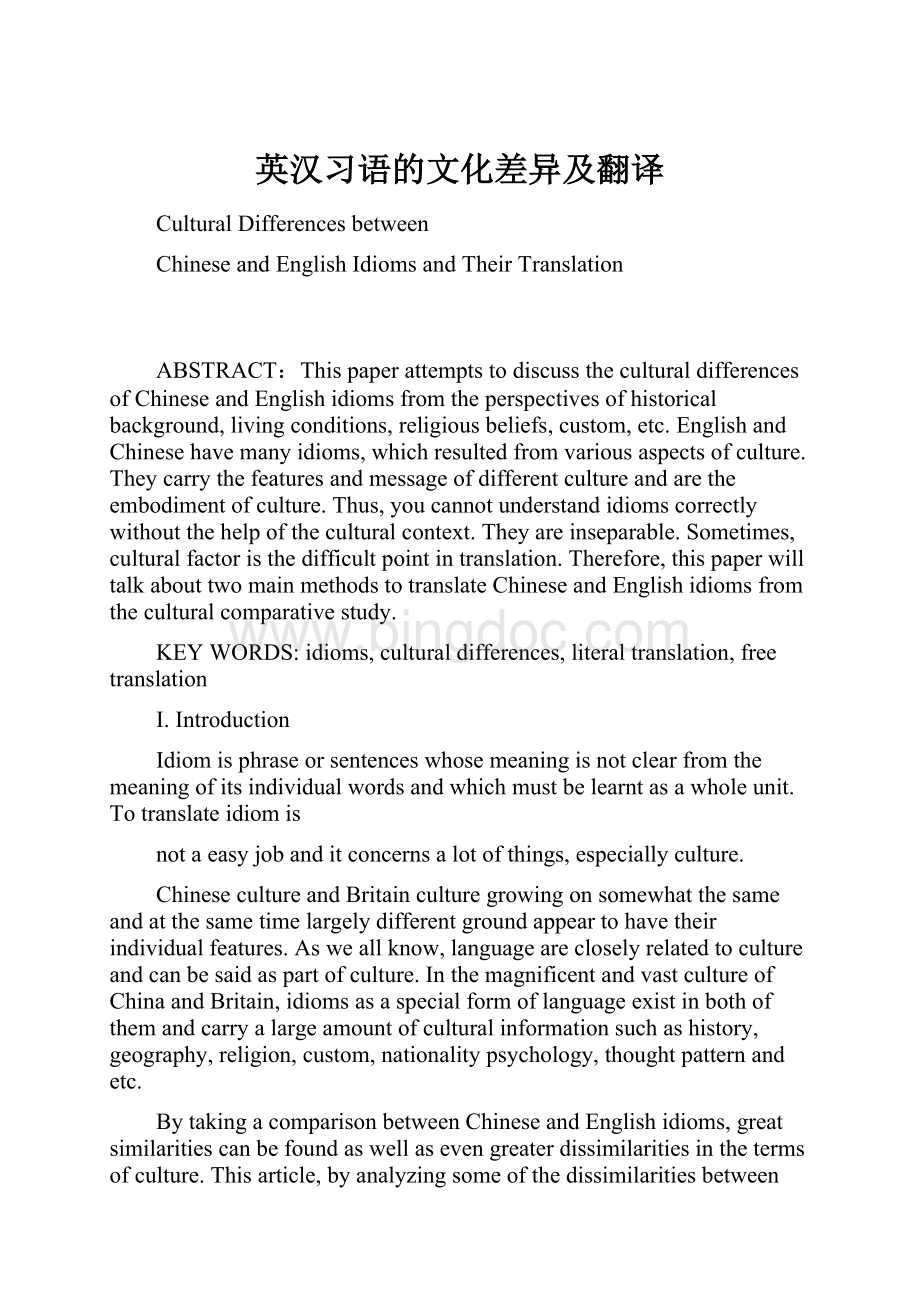英汉习语的文化差异及翻译Word文件下载.docx
《英汉习语的文化差异及翻译Word文件下载.docx》由会员分享,可在线阅读,更多相关《英汉习语的文化差异及翻译Word文件下载.docx(23页珍藏版)》请在冰点文库上搜索。

ChineseandEnglishIdiomsandTheirTranslation
ABSTRACT:
ThispaperattemptstodiscusstheculturaldifferencesofChineseandEnglishidiomsfromtheperspectivesofhistoricalbackground,livingconditions,religiousbeliefs,custom,etc.EnglishandChinesehavemanyidioms,whichresultedfromvariousaspectsofculture.Theycarrythefeaturesandmessageofdifferentcultureandaretheembodimentofculture.Thus,youcannotunderstandidiomscorrectlywithoutthehelpoftheculturalcontext.Theyareinseparable.Sometimes,culturalfactoristhedifficultpointintranslation.Therefore,thispaperwilltalkabouttwomainmethodstotranslateChineseandEnglishidiomsfromtheculturalcomparativestudy.
KEYWORDS:
idioms,culturaldifferences,literaltranslation,freetranslation
Ⅰ.Introduction
Idiomisphraseorsentenceswhosemeaningisnotclearfromthemeaningofitsindividualwordsandwhichmustbelearntasawholeunit.Totranslateidiomis
notaeasyjobanditconcernsalotofthings,especiallyculture.
ChinesecultureandBritainculturegrowingonsomewhatthesameandatthesametimelargelydifferentgroundappeartohavetheirindividualfeatures.Asweallknow,languagearecloselyrelatedtocultureandcanbesaidaspartofculture.InthemagnificentandvastcultureofChinaandBritain,idiomsasaspecialformoflanguageexistinbothofthemandcarryalargeamountofculturalinformationsuchashistory,geography,religion,custom,nationalitypsychology,thoughtpatternandetc.
BytakingacomparisonbetweenChineseandEnglishidioms,greatsimilaritiescanbefoundaswellasevengreaterdissimilaritiesinthetermsofculture.Thisarticle,byanalyzingsomeofthedissimilaritiesbetweenChineseandBritainidioms,revealstheculturaldifferencesinvariousaspectsbetweenChinaandBritain,whichresultinthedifferencesinidiomsofthetwolanguages.ThefindingsmayserveasaguidetothefurtherresearchontherelationshipbetweenidiomsandcultureandthrowsomelightonthelearningofEnglishidioms.
Talkingofdifferentcultures,peopleoftenthinkabouttheirdifferences,suchasthedifferencesbetweenChineseandWesterncultures,differencesbetweeneasternandwesternculturesandsoon.Therefore,differentiationtogetherwithanalysisistheusualwaytocomparedifferentcultures.Butwhatweneglectisthepremiseofcomparisonthatistheprerequisitecomparabilityofthings.Inotherwords,itmeansthethingswecomparemusthavesomethingincommon.Forexample,comparingmenandwomenforthembotharebelongingtomankind;
comparingEnglishandChineseforthempertainingtothelanguagesystem.IfsomeonecomparesmanwithEnglishorwomanwithChineselanguage,wewillallsurelyburstintolaughter,andtheyarenotrelatedatall.Inotherwords,thetwothingswecompareshouldbesimilar.Hencethedifferenceandthesimilarityareinseparable.Whenwecompareculturaldifferences,wehavetocomparethemonthebaseoftheculturalsimilarities.Comparingdifferentculturesshouldbelikemakingfriends----seekingcommonpointswhilereservingdifferencesistherightway.Cultureisdefinedas,“thetotalityofbeliefsandpracticesofasociety”(Nida301).It’samixtureofalmosteveryaspectofasociety,suchasreligion,politics,history,artsandsoon.It’sdifferentamongcountriesintheworld.Forexample,willingnesstocommitsuicideinordertoproveone’sinnocencewaspopularandunderstandableinsomeAsiancountries,suchasJapanandChina.WhileforAmerican,itispreposterous.
Idiomsarefromvariousaspectsofculture.Theyareembodimentofculture.AccordingtoLongmanDictionaryofEnglishIdioms,“anidiomisafixedgroupofwordswithaspecialdifferentmeaningfromthemeaningoftheseparatewords”.Webster’sDictionaryhasdefineditas“anexpressionwhosemeaningisnotpredictablefromtheusualmeaningofitselements”.Throughthesedefinitions,onecaneasilyfindoutthekeypointaboutidioms,whichis,theirmeaningscannotusuallybediscoveredthroughthecomprehensionoftheindividualwords.“Whiteelephant”,forinstance,anidiommeaning“auselesspossession”,hasactuallynothingtodowitheitherthewhitecolorortheanimalelephant.Thepurposeofusingidiomsinbothspeechandwritingistoaddlocalandculturalcolorortointensifyconcisenessandvivacitytoamentalprocessorstateaconcept,aperson,anaction,aqualityoranobject,ortotriggerimaginationofthereaders.
Idiomtocultureiswhatlanguagetothinking;
itisonekindofexpression-form.Hence,idiomsarethecarrierofaculture.Fromtheidioms,wecantouchthemeaningoftheculture;
fromthecomparisonoftheexpression-form,suchascomparingliteratures,comparinglinguistics,etc.Wemaypeektheculturesimilaritiesanddifferences.Theidiomhasrichandcolorfulforms.Theserefinedphrases,widelyused,frequentlyaccumulateandsummarizethedistillationofmankind’sculturalexperience.Theyalwaystouchthefundamentalpartofmankind’sexistence.Therefore,indifferentcultures,wecanfindsimilarexpressions.
Asweknow,idiomsarewidelyused.Theyarepassedfromgenerationtogenerationwithoutchanging,evensomeidiomsaregrammaticallywrong.Idiomsaretheessencesoflanguages,reflectingthenativecultures.Manypeoplecan’tproperlyunderstandthemeaningofaphraseorsentencewithoutanewwordinitjustbecausetheyknowlittleaboutculturaldifferencesbetweenE/Cidioms.Thispaper,willdiscusstheirculturaldiscrepanciesinlivingenvironment,custom,religionbelieves,historicalallusionsandsomeusefulapproachestotranslatingE/Cidioms.Thispaperwilldiscusstwoapproachestotranslatingtheidioms.Eachapproachhasitsownadvantagesanddisadvantages,soweneedtotaketheidioms’culturalbackgroundintoconsiderationtochoosethebestapproachestodotranslations.
IdiomsinbothEnglishandChineseareveryrich-fullandtheyareessentiallynationalincharacter,thatistosay,theircomponentsaremostlynativeelements.EnglishandChineseidiomspossesstheirownnationalculture.Asdifferentnationspossessdifferentcultures,itmaydifficulttodoagoodjobintranslation.However,ifonehasenoughbackgroundknowledgeoftheidioms,itmayhelponetodoagoodtranslation.
TheEnglish—speakingandChinese—speakingpeoplepossessdifferentcultures.Theyliveindifferentgeographyenvironment,holddifferentreligiousbelieves,andhavedifferentcustoms.Thoseelementsmakethetranslationahardwork.Tosolvetheproblem,translatorscanchooseproperapproachestosmooththeroadtodoagoodtranslation.Theapproachesavailableareliteraltranslation,freetranslation.
CulturedifferencesIdioms,reflectingcultureandsociety,areanimportantpartoflanguage.Greatworksandspeechesarefullofidioms,whichwilladdcolourtothemandinterestthereadersorlisteners.Buttheimproperuseoroverusemakesthelanguagesoundsunnaturalandeffected.Idiomswerecreatedalongtimeago,unchanged.Theyaretheessenceoflanguages.ThecorrectuseofidiomaticEnglishisonemainaimofnon-nativelearners,becauseleaningandusingidiomsisthebestwaytomasteralanguage.Itwillhelponetoimproveone’sEnglishveryquickly.
CultureasdefinedbyNidaisthetotalityofbeliefsandpracticeofsociety,permeateeverycornerofthesociety,andinturnthedifferentculturemayconflicteverywhereintheformofconcept,language,andbehavior.Whenonedoingtranslation,whetheronecoulddoagoodjobdependsmainlywhetheronecouldmastertwocultures.Learningalanguageisakindlearningofcultureandhabitofthecountrywherethelanguageisspoken.
Cultureandlanguageiscloselyrelatedandactuallycan’tbeseparated.Asaresult,therelationbetweenthemexertsgreatinfluenceontranslation.Differentculturemayconflicteachother,soaliteraltranslationisnotalwaystheclosesttotheoriginalmeaning.Asmerry/happy/lovelyascricketistoshowahappymoodinEnglish,butifwetranslateitinChinese快乐如蟋蟀,itwillperplextheChinesepeople,cricketisasymbolofgrief,desolations,andworriesreflectedinthepoemas时光易逝,岁暮将至,蟋蟀在堂,岁亟其末.AncientChinesepeopleconsideredthatthecricketlivedonthetopofthetreeanddrankdew,livinganobleandhermeticlife,asinthepoem,居高声自远,非是籍秋风.Peoplewhoweredepressedanddismayedconveyedtheirfeelwithcricket,asthepoem露多飞难进,风多响易沉.Weshouldtranslateitinto快乐如麻雀/神仙Anotherexample,动如脱兔,canwetranslateitinto‘’asquickasahare?
IntheEnglish—speakingcountries,hareistheimageoftimidness,whilemousecondemnedbytheChinesepeopleistheimageofquickness.Soweshouldtranslateitintoasquickasamouse.InChinesewesay胆小如鼠,butwecan’tliterallytranslateitintoEnglishastimidasamouse,sincemouseisconsideredasasmartandnimbleanimalaccordingtowhichthecartoonMickyMouseismade.Wecantranslateitintoastimidasahare.Culturedifferencesadddifficulttotranslating.Todogoodtranslating,oneneedtomastertheforeigncountries’cultures.Withoutmasteringtheforeigncounties’cultures,non-nativelearnersmayfindithardtounderstandtheidiomsnottomentiondoingagoodtranslation.MaineffectsonidiomsareresultfromtheculturaldifferencesbetweenEnglishandChinese.
Becauseofdifferencesinhistoryandculture,wordsandexpressionshavetheirownassociativemeaningsindifferentlanguages.InChinese,weuse锦囊妙计toindicatethatonehaveagoodsolutiontoadifficultproblemanddispeldanger.InEnglish—speakingcountries,peopleuse“haveanaceonone’ssleeves”.Inthethree